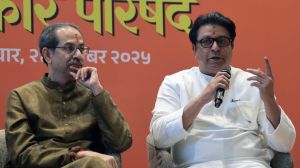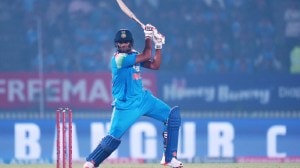A confident conversation
I had the opportunity to meet British Foreign Secretary Jack Straw during my recent visit to London as leader of an Indian MPs delegation. I...

I had the opportunity to meet British Foreign Secretary Jack Straw during my recent visit to London as leader of an Indian MPs delegation. In our conversation over tea, he came across as quite candid and analytical in his approach towards foreign policy. Straw is a skilled administrator and an astute politician. He has earned his reputation, especially among Indian journalists in London, as an unabashed India buff, and a cricket buff!
I was thrilled to hear his views about India and he surprised me with highly bullish views about Indian growth. He is also both sympathetic and appreciative of India8217;s relentless fight against terrorism. He did not hesitate to ask aloud for why is it that there is not a single international terrorist from India? Why is it that despite being the home to world8217;s second largest population of Muslims, not a single Indian Muslim has joined the ranks of Al Qaeda? Jack implicitly acknowledged the potency of Indian system, specifically the stringent Indian laws when he admitted that in the post 7/7 era, British laws require to be amended. While British laws have proved strong enough to tackle the Irish terrorism, they will prove to be grossly inadequate to meet the new challenges of globalised terrorism.
Straw has earlier been a home secretary of Britain. Today he reflects the general mood across British establishment when he says he wants even closer cooperation with India, not just in fighting terrorism, but also in agriculture, trade and technology research. But predictably, it was terrorism that occupied his mind and our discussions. He assured us that his administration will not allow Indians to suffer just because they had faces difficult to differentiate from other Asians. It was reported that some Indians faced harassment after the 7/7 London bombings. Straw is of the firm opinion that though Islam remains a sacred religion, terrorism and jihad in the name of Islam have become the biggest challenge for law-abiding countries. A few misguided people are bringing a bad name to their religion.
Before meeting Straw, we were taken to the India Office in British foreign ministry. This office laid the foundations of British rule in India and it has kept its name and its imposing status as a heritage building after more than two centuries. The opulent office still preserves valuable artifacts, with the statues and paintings of Indian Maharajas still occupying pride of place.
State-sponsored apathy
The Uttar Pradesh state bureaucracy can teach a thing or two to politicians in sucking up to its chief minister. In the face of hundreds of child deaths by Japanese Encephalitis, both Home Secretary and Health Secretary are desperate to criticize and negate the endeavours being made by Rahul Gandhi. The helicopter he arranged for spraying mosquito-repellent over Gorakhpur, which would help contain the disease for it spreads through mosquitoes, stays grounded after almost a week because the administration is sleeping over the necessary permission.
It is not often seen that a state government8217;s machinery not just gives up in face of a major crisis, but further proves its apathy by hysterically criticizing those who are moved to take stock of the situation. If it is true that the CM has refused to pay attention to Gorakhpur merely because his party lost elections there, it is a bad omen for democracy in India. I have heard that there is negligible power supply in constituencies which failed to elect Samajwadi party candidates. There are even reports of Mulayam Singh Yadav touring these districts and openly commenting that he will not address any of their grievances because they did not vote for his candidate in elections. This is for the first time that politics of vendetta is being played so brazenly, and it is setting an extremely worrying precedent.
Worse, Mulayam Singh8217;s government made a political issue out of Rahul Gandhi8217;s visit to Gorakhpur and picked it apart. Criticism of Rahul8217;s visit seems rather odd coming from a CM who has so far failed to even acknowledge the mounting toll, let alone visit the poor, helpless victims. The state health machinery is yet to declare the encephalitis outbreak as an epidemic, while this news is making headlines across the world. It is ironic that apart from a lavish dinner hosted by state government for Bill Clinton, the only press UP gets in world media today is the government8217;s complete lack of control over a massive epidemic outbreak, which has killed more than 700 people in last two months.
The return of cricket
Cricket is back to its pride of place in English hearts following a spectacular win over Australia in the just concluded Ashes. The game had seen tremendous downfall in recent years, beginning with a dismal English performance in 1999 World Cup, and the total indifference of British spectators towards it. The situation came to a point when English Cricket Board had trouble finding sponsors. One dramatic test series win over Australia has changed all that. The stadia are back to full crowds and tickets for the last test of the just-concluded series were traded for thousands of pounds. Sponsors are now making a beeline for star players like Flintoff and Pieterson. It was a pleasurable sight to see how old cricket heroes are also getting recognition. I was invited to a dinner hosted at Lords by former English captain Ian Botham, where notorious author Jeffrey Archer conducted a charity auction for cricket memorabilia, and saw an Englishman bid pound;9,000 for winning a dinner with Botham!
The writer is a Congress MP in Rajya Sabha. Email: shuklarajeevgmail.com
- 01
- 02
- 03
- 04
- 05































